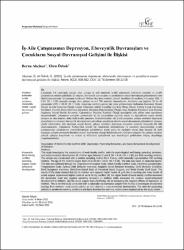| dc.contributor.author | Akçinar Yayla, Berna | en_US |
| dc.contributor.author | Özbek, Ebru | en_US |
| dc.date.accessioned | 2022-09-30T07:03:36Z | |
| dc.date.available | 2022-09-30T07:03:36Z | |
| dc.date.issued | 2021-30-12 | |
| dc.identifier.citation | Akçinar Yayla, B. & Özbek, E. (2022). İş-aile çatışmasının depresyon, ebeveynlik davranışları ve çocukların sosyal-davranışsal gelişimi ile ilişkisi. Nesne Dergisi, 9(22), 838-862. doi:10.7816/nesne-09-22-06 | en_US |
| dc.identifier.issn | 2147-6489 | |
| dc.identifier.uri | https://hdl.handle.net/11729/4917 | |
| dc.identifier.uri | http://dx.doi.org/10.7816/nesne-09-22-06 | |
| dc.identifier.uri | https://search.trdizin.gov.tr/yayin/detay/521631 | |
| dc.description.abstract | Çalışmada 2-6 yaşlarında çocuğu olan, çalışan ve evli annelerin iş-aile çatışmasını tetikleyen nedenler ve iş-aile çatışmasının onların psikolojik iyi oluşları, ebeveynlik davranışları ve çocuklarının sosyal-davranışsal gelişimleriyle olan ilişkisi incelenmiştir. Çalışmanın örneklemi Türkiye’den basit seçkisiz, temsili örneklem ile seçilmiş 2-6 yaşları (Ort. = 4.14, SS = 1.30) arasında çocuğu olan, çalışan ve evli 700 anneden oluşmaktadır. Annelerin yaş dağılımı 20 ile 49 arasındadır (Ort. = 34.02, SS = 5.46). Araştırma verileri yapılan yüz yüze görüşmelerde kullanılan Kurumsal Destek Ölçeği, İş-Aile Çatışması Ölçeği, Çocuk Yetiştirme Anketi, Çocuklar için Kısa Mizaç Ölçeği, Eyberg Çocuk Davranışı Envanteri, Uyumlu Sosyal Davranış Envanteri, Davranış Değerlendirme Ölçeği, Kısa Semptom Envanteri, Çok Boyutlu Algılanan Sosyal Destek Envanteri, Çalışmaktan Duyulan Suçluluk Ölçeği aracılığıyla elde edilen anne raporlarına dayanmaktadır. Çalışmanın sonuçları göstermiştir ki, (i) çalışmaktan suçluluk duyan ve algıladıkları sosyal destek seviyesi az olan anneler, daha fazla iş-aile çatışması deneyimlemekte; (ii) iş-aile çatışması, çalışan annelerin depresyon seviyelerini ve olumsuz ebeveynlik davranışlarını arttırırken, çocukların olumlu sosyal-davranışsal gelişimlerini olumsuz yönde etkilemekte; (iii) algılanan sosyal destek, çalışan annelerin depresyon seviyeleri üzerinde koruyucu bir etki oluşturmaktadır. Çalışmanın Türkiye’den temsili bir örneklemle oluşturulması ve annelerin deneyimlediği iş-aile çatışmasından çocuklarının sosyal-davranışsal gelişimlerine kadar geniş bir ekolojiyi ulusal alan yazında ilk defa kapsayan çalışma olmasıyla literatüre önemli katkılarının olacağı beklenmektedir. Çalışma sonuçları ile, çalışan annelere yönelik çalışma koşullarını ve evdeki iş bölümünü iyileştirmek için destekleyici politikalara ihtiyaç duyulduğu vurgulanmaktadır. | en_US |
| dc.description.abstract | This study investigated the associations of work-family conflict with the psychological well-being, parenting behaviors, and socio-emotional development of children aged between 2 and 6 (M = 4.14, SD = 1.30) and their working mothers. The sample was constructed with a random sampling method from Turkey, with nationally representative 700 working mothers. The age of the mothers ranged from 20 to 49 (M = 34.02, SD = 5.46). The data was based on maternal reports. The data was collected through the Organizational Support Scale, Work-Family Conflict Scale, Parenting Questionnaire, Temperament Scale, Eyberg Child Behavior Inventory, Adaptive Social Behavior Inventory, Child Behavior Checklist, Brief Symptoms Inventory, Multidimensional Scale of Perceived Social Support, and Work-Family Guilt Scale. The results of the study showed that (i) the mothers who reported higher levels of guilt due to working and lower levels of social support experienced higher levels of work-family conflict; (ii) the higher levels of work-family conflict increased the depression level and negative parenting behaviors in mothers while decreased the positive social-behavioral development in children, (iii) the social support had a buffering role in decreasing the negative effects of depression in mothers. This is the first study conducted with a nationally representative sample from Turkey to investigate an extensive ecology from mothers’ work-family conflict to their children’s socio-emotional development. The need for supporting policies to ameliorate working conditions and labor divisions for working mothers were emphasized by the study results. | en_US |
| dc.language.iso | tur | en_US |
| dc.publisher | Sanat ve Dil Araştırmaları Enstitüsü | en_US |
| dc.rights | info:eu-repo/semantics/openAccess | en_US |
| dc.subject | İş-aile çatışması | en_US |
| dc.subject | Ebeveynlik | en_US |
| dc.subject | Destek | en_US |
| dc.subject | Sosyaldavranışsal gelişim | en_US |
| dc.subject | Work-family conflict | en_US |
| dc.subject | Parenting | en_US |
| dc.subject | Support | en_US |
| dc.subject | Sociobehavioral development | en_US |
| dc.title | İş-aile çatışmasının depresyon, ebeveynlik davranışları ve çocukların sosyal-davranışsal gelişimi ile ilişkisi | en_US |
| dc.title.alternative | Association of work-family conflict with depression, parenting behaviors, and socio-behavioral developmentof children | en_US |
| dc.type | article | en_US |
| dc.description.version | Publisher's Version | en_US |
| dc.relation.journal | Nesne Dergisi | en_US |
| dc.contributor.department | Işık Üniversitesi, İktisadi, İdari ve Sosyal Bilimler Fakültesi, Psikoloji Bölümü | en_US |
| dc.contributor.department | Işık University, Faculty of Economics, Administrative and Social Sciences, Department of Psychology | en_US |
| dc.contributor.authorID | 0000-0003-4768-7463 | |
| dc.identifier.volume | 9 | |
| dc.identifier.issue | 22 | |
| dc.identifier.startpage | 838 | |
| dc.identifier.endpage | 862 | |
| dc.peerreviewed | Yes | en_US |
| dc.publicationstatus | Published | en_US |
| dc.relation.publicationcategory | Makale - Ulusal Hakemli Dergi - Kurum Öğretim Elemanı | en_US |
| dc.contributor.institutionauthor | Akçinar Yayla, Berna | en_US |
| dc.relation.index | TR-Dizin | en_US |


















